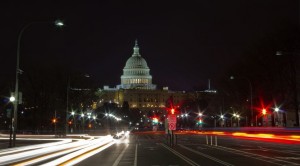On the Hill: Senate Opposition to Russell Amendment Shows Changed Attitudes to LGBTQ Rights

Last week forty-two US senators came together to oppose the anti-LGBTQ Russell Amendment in the 2016 National Defense Authorization Act (NDAA). If passed, the amendment would allow any religious organization to discriminate against LGBTQ Americans and countless other communities while still receiving government grants. And as John Riley from Metro Weekly notes, “The amendment’s broadened religious exemptions would be extended to all federal agencies, effectively undercutting an Obama executive order prohibiting discrimination by contractors and subcontractors on the basis of sexual orientation and gender identity.”
This amendment has worried humanists and the nontheistic community since its introduction in the House by Rep. Steve Russell (R-OK), which is why the American Humanist Association has repeatedly advocated against the amendment on Capitol Hill and has tracked its movement on our 2016 Congressional Scorecard.
But humanists and members of the LGBTQ community are no longer fighting this battle against intolerance and religiously motivated discrimination alone. In addition to the letter by the forty-two senators in opposition to the Russell Amendment, President Obama has promised to veto the entire bill if it’s in the final text, which is an extraordinary display of solidarity considering the importance of the bill for US defense capabilities and military preparedness.
These actions by government officials remind us how much things have changed for the LGBTQ community in the United States. While many states still allow for employment and housing discrimination against LGBTQ Americans, there has been undeniable progress over the last decade when it comes to opposing religiously motivated discrimination against the LGBTQ community at both the federal and local level. Just several years ago, it would have been a stretch of the imagination to think that almost half of the Senate along with the president would be willing to torpedo an important defense bill just to ensure that LGBTQ Americans were treated fairly by their government and fellow citizens.
This progress won’t (and shouldn’t) placate the anti-discrimination community, but it should serve as a source of inspiration for what can be accomplished through consistent legislative advocacy and education outreach efforts, which have helped more and more Americans understand that LGBTQ individuals deserve equal rights and freedoms. While the next steps on the NDAA are unclear, the same cannot be said for the fight to end religiously motivated discrimination. Advocates for equal treatment for all should recognize that if they continue fighting back against discriminatory legislative measures while continuing to talk to their friends, families, and neighbors about what it means to be gay, lesbian, bisexual, transgender, or queer in America, legislation like the Russell Amendment will have less and less a chance to become law.
